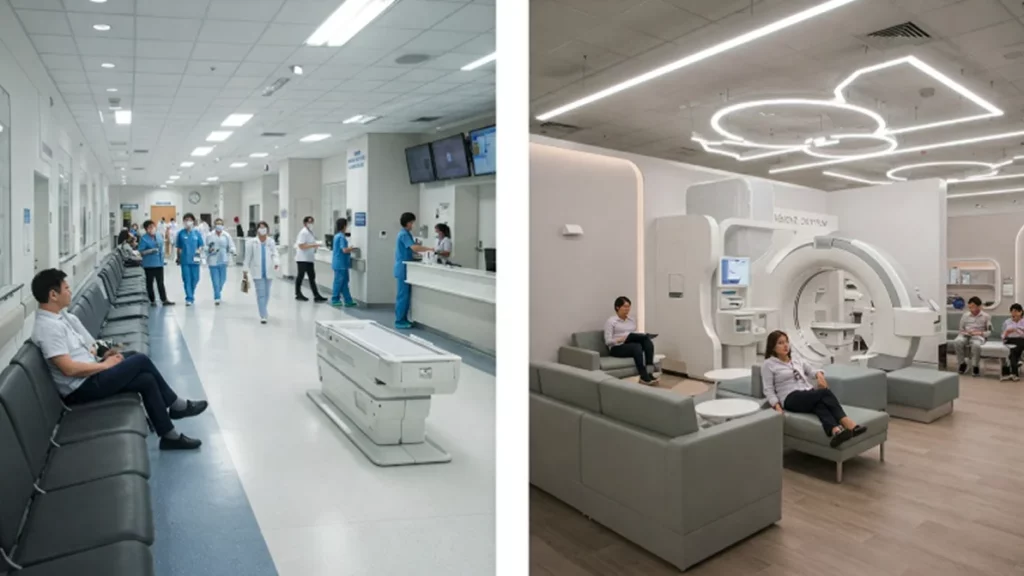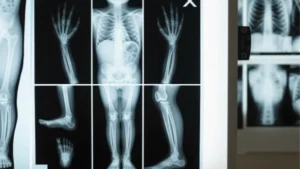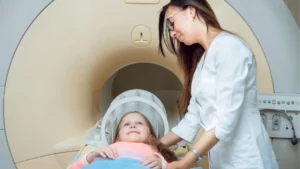Have you ever been told you need a scan and suddenly wondered, “Where do I even go for this?” Between hospitals and imaging centers, the options can feel confusing.
And if you’re searching for where to get a CT scan or deciding between an MRI at imaging center or hospital, the choice often comes down to more than just location.
Understanding your medical imaging options can help you save time, money, and stress. Let’s break down the difference between an imaging center vs hospital and what you should consider before booking your next scan.
Imaging Centers: What They Offer

Imaging centers are outpatient facilities focused solely on diagnostic imaging. This means you’re not dealing with the chaos of a hospital, and the entire experience is usually streamlined. Most imaging centers offer services like MRI, CT scans, X-rays, ultrasound, and mammograms. Since they specialize in this area, the staff is often highly trained in imaging procedures and patient care for these services.
Hospitals: What They Offer
Hospitals provide a wide range of healthcare services beyond just imaging. Their imaging departments are usually part of a much larger system that serves emergency cases, inpatients, and outpatients alike. You’ll often find advanced or specialized technology in hospitals, particularly for complex or rare conditions. However, because hospitals handle so many patients and departments, scheduling can be slower and more expensive.
What Types of Scans Are Commonly Needed?
When your doctor recommends a diagnostic scan, it’s usually to confirm or rule out a condition, monitor an ongoing issue, or guide treatment. These tests fall under the broader category of medical imaging options, and the most commonly ordered types include the following:
CT (Computed Tomography) Scans
A CT scan uses X-rays and computer processing to create detailed cross-sectional images of your body. It’s especially useful for diagnosing conditions related to the brain, chest, abdomen, and bones. CT scans are fast, which makes them ideal in emergency settings or when quick answers are needed. If you’re deciding where to get a CT scan, consider both timing and cost—imaging centers often offer faster appointments and lower pricing compared to hospitals.
MRI (Magnetic Resonance Imaging)
MRIs use powerful magnets and radio waves to produce highly detailed images of soft tissues—such as the brain, spinal cord, joints, and organs. Unlike CTs, MRIs don’t use radiation. However, they typically take longer and require you to lie still inside a tunnel-like machine. If you’re torn between an MRI at imaging center or hospital, think about your comfort level, the urgency of the scan, and the facility’s expertise in the area being studied.
X-rays
One of the most common and oldest imaging methods, X-rays are quick and simple. They’re commonly used to look at bones, detect fractures, evaluate chest or lung conditions, and even check for dental issues. X-rays are widely available at both hospitals and imaging centers, and the difference in cost can be substantial—something to keep in mind if you’re paying out of pocket.
Ultrasounds
Ultrasound scans use sound waves to produce real-time images of the inside of your body. They’re commonly used during pregnancy, but also for examining the heart (echocardiogram), blood vessels, kidneys, and other organs. Ultrasounds are painless, safe, and available in both outpatient and hospital settings. Since they don’t involve radiation, they’re ideal for monitoring and routine check-ups.
Mammograms
Mammograms are specialized X-rays used for breast cancer screening and diagnosis. Women over a certain age—or those at high risk—are typically advised to get annual or biennial mammograms. Many imaging centers offer dedicated breast imaging services, which may provide a more comfortable and focused experience compared to general radiology departments in hospitals.
Bone Density Scans (DEXA Scans)
These scans measure bone mineral density to assess the risk of osteoporosis and fractures. They’re commonly recommended for older adults or those with risk factors for bone loss. A bone density scan is quick, involves very low radiation, and is often more affordable when done at an imaging center.
Key Factors to Consider When Choosing

Trying to choose between an imaging center vs hospital can feel overwhelming—especially when you’re already dealing with a health concern. While both settings offer reliable medical imaging options, they differ in several ways that can affect your experience, cost, and convenience.
Here are some key factors to help with your decision:
Cost
Imaging Centers:
One of the most noticeable differences is cost. Imaging centers generally have lower operational expenses, which often means more affordable pricing for patients. If you’re uninsured or have a high-deductible plan, the savings can be substantial—sometimes hundreds to thousands of dollars less than what a hospital might charge for the same scan.
Hospitals:
Hospital-based imaging tends to be more expensive. You’re not only paying for the scan but also for the facility fees that come with a larger healthcare system. Even with insurance, your out-of-pocket expenses may be higher, especially if the hospital is out-of-network.
Convenience and Accessibility
Imaging Centers:
Imaging centers are typically outpatient-focused, which means quicker appointment scheduling, shorter wait times, and faster check-ins. Many are located in easily accessible buildings with on-site parking, and they often offer extended hours, including weekends.
Hospitals:
Hospitals can be harder to navigate, both physically and logistically. Scheduling may take longer, parking may be limited or paid, and the sheer size of the facility can be overwhelming. You may also have to wait longer due to a higher volume of emergency and inpatient needs.
Specialization and Expertise
Imaging Centers:
These facilities are built around diagnostic services, so the staff—including technologists and radiologists—are often highly specialized in reading and performing scans. This can be a huge benefit for routine imaging and early detection.
Hospitals:
In cases where your condition is complex or rare, hospitals may be better equipped. Many have subspecialist radiologists on staff and access to multidisciplinary teams. If your scan results need to be coordinated with other departments, this is often done more efficiently within a hospital system.
Technology and Equipment
Both hospitals and reputable imaging centers invest in state-of-the-art equipment. However, hospitals may have access to highly specialized machines, such as those used for advanced neurology or cardiac imaging. That said, many imaging centers now offer cutting-edge technology that covers most routine and advanced imaging needs. Always check if the facility provides the specific scan your doctor requested.
Patient Experience and Comfort
Imaging centers typically offer a calmer, more personalized environment. Since they only focus on diagnostics, the atmosphere tends to be quieter, the staff more focused on individual care, and the wait time shorter. This can be especially helpful if you’re anxious about the procedure or have mobility issues.
Hospitals, while equipped for more complex cases, can feel more clinical and hectic. The experience can sometimes feel rushed, and it’s not uncommon to wait longer for appointments or results due to higher patient volume.
Urgency of the Scan
If your doctor orders a scan urgently—such as in the ER or during a hospital stay—then the hospital is the only option. For routine or follow-up imaging, however, outpatient imaging centers are usually a faster and more accessible choice.
Referring Physician’s Preference
Your referring doctor may recommend a specific facility based on experience, availability, or their professional network. In some cases, they may default to a hospital out of habit or convenience. However, if you’re concerned about costs, scheduling, or location, it’s okay to ask about alternatives. Understanding your medical imaging options helps you make an informed decision about where to get medical scan services.
When Should You Choose an Imaging Center?
For many patients, imaging centers are the more practical and cost-effective option. If your scan isn’t part of an emergency or complex hospital-based treatment plan, these facilities offer several benefits:
You need a routine or non-emergency scan
Imaging centers are ideal for scheduled scans like X-rays, ultrasounds, CTs, or MRIs that aren’t time-sensitive. If your doctor is monitoring a condition or wants to take a closer look at something without urgency, an outpatient imaging center can usually see you faster.
You’re paying out of pocket or want to reduce costs
The cost of scans at hospital vs imaging center can be significantly different. If you’re uninsured, underinsured, or have a high deductible, choosing an imaging center can save you a lot of money. For those who still need assistance with out-of-pocket expenses, medical loans can provide a manageable way to cover necessary procedures.
You want to get in and out quickly
Imaging centers are built for efficiency. They don’t have to balance emergency cases or inpatient schedules, which means you can often get same-week appointments and spend less time in the waiting room.
You’re looking for a more personalized, less stressful experience
The environment at imaging centers tends to be calmer and more focused. With fewer patients to manage, the staff can offer a more personal approach, making the whole experience smoother and less overwhelming.
You’re comparing prices and asking, “Where to get a CT scan affordably?”
Many patients search for where to get a CT scan without breaking the bank. Imaging centers often provide transparent pricing and may even offer discounts for cash-paying patients.
When a Hospital is the Better Choice

While imaging centers are perfect for many scenarios, there are times when a hospital is the more appropriate place for your scan:
Your condition is complex and requires coordination with multiple specialists
If your imaging results need to be shared quickly with a team of doctors—such as in cases involving surgery, oncology, or advanced cardiology—having your scan done at a hospital ensures seamless communication.
Your doctor recommends a specific piece of equipment only the hospital has
Some rare or highly specialized scans require equipment that only certain hospitals have. In these cases, following your doctor’s referral is the safest and most accurate option.
Your scan is urgent or part of a hospitalization
If you’re currently hospitalized or your doctor says the scan needs to be done immediately, the hospital is the only logical setting. Imaging centers aren’t equipped for emergency care.
You need sedation or anesthesia for the scan
Some patients—especially children, those with claustrophobia, or individuals who can’t stay still for long periods—may need light sedation or anesthesia. Hospitals are better prepared to provide this level of care safely.
Choosing the Right Imaging Provider for You
So between imaging center vs hospital, which should you choose? The best decision often depends on your situation, budget, and the type of scan you need. For most routine imaging needs, an outpatient center offers faster scheduling, a smoother experience, and lower costs.
If you’re wondering where to get medical scan services that combine comfort, convenience, and quality, check out One Step Diagnostic. With multiple locations and a full range of services—from CT and MRI scans to X-rays and ultrasounds—One Step Diagnostic gives you the peace of mind that comes with expert care and advanced technology.
Need to schedule your scan or ask a question? Contact One Step Diagnostic today to get started.




